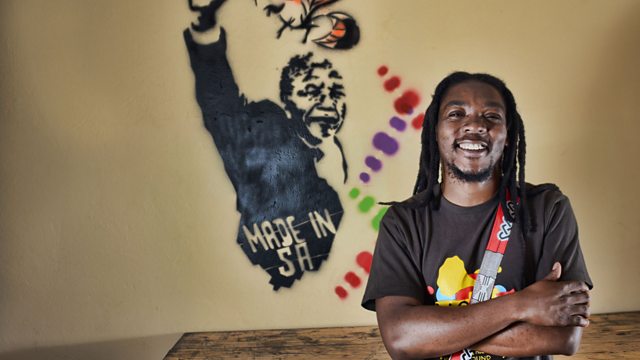Johannesburg, City of Recent Arrivals
Thabiso Mohare talks to Johannesburg-based writers and poets, including Ivan Vladislavic, who has documented the changing city in his novels and non-fiction work.
Writing a new South Africa
A picture of South Africa now, as seen by a new generation of writers and poets.
In programme 1 Thabiso talks to Johannesburg-based writers and poets about the changing cityscape and how the past impacts on the present in their work. He takes a walk through the bustling University district of Braamfontein with Ivan Vladislavic, who has documented the city in his novels and non-fiction work 'Portrait with Keys', and they explore writing about Hillbrow, the troubled inner city district, where the social integration and dynamic culture looked in the early 1990s as though it might be a positive future vision of the country. He talks to the prominent poet Lebo Mashile, an inspiration to the younger poets coming through now, about the emergence of the black female voice in the past twenty years, and the legacy of the past. And he meets Niq Mhlongo, whose most recent book 'Way Back Βι¶ΉΤΌΕΔ' looks critically at the struggle against apartheid, and the way those who went into exile to fight for the movement are haunted by their experiences.
In a three part series, street poet 'Afurakan' Thabiso Mohare explores the major cities of Johannesburg and Cape Town, talking to 'Born Frees', writers of the freedom generation - those born under apartheid but whose adult years have been spent in a new democracy, and gaining insights from an older generation who only began to publish their work in the new democratic era.
Thabiso looks at South Africa two decades after the fall of apartheid, through the themes writers are choosing to engage with in their work. These authors, poets and playwrights are exploring the past and present, from apartheid's legacy to political corruption, and the chaos of the inner city; some are exorcising ghosts, and some tackling current issues, or looking to an imagined future. There is plenty to write about after the end of the struggle.
Thabiso talks to new voices who are just making their names, and those who are already established, addressing the problems they face, causes for optimism, and the way conditions and opportunities have changed for writers in the past two decades. He looks at what they feel to be their literary heritage, and who they take inspiration from in a culture still feeling the inequalities of the educational legacy of apartheid. Literacy issues and the lack of a culture of reading more widely mean that the market for books is small, and the road to the arts truly blossoming into normalcy in South Africa after the end of apartheid has been uneven and complex. Other outlets for storytelling too - poetry and spoken word events, plugging into older traditions - are supporting the flowering of a diversity of voices as hoped for when the political landscape changed so radically in 1994, with writers of all ethnicities pitching in to the fray. Radio 4 explores the range of voices now being heard and the picture they present.
Last on
More episodes
Previous
You are at the first episode
Next
Broadcasts
- Thu 19 Feb 2015 11:30Βι¶ΉΤΌΕΔ Radio 4
- Tue 25 Aug 2015 16:00Βι¶ΉΤΌΕΔ Radio 4
- Mon 31 Aug 2015 00:15Βι¶ΉΤΌΕΔ Radio 4
British Council interactive conversations on contemporary literature, spoken word and poetry scenes in South Africa.
Find out more here

